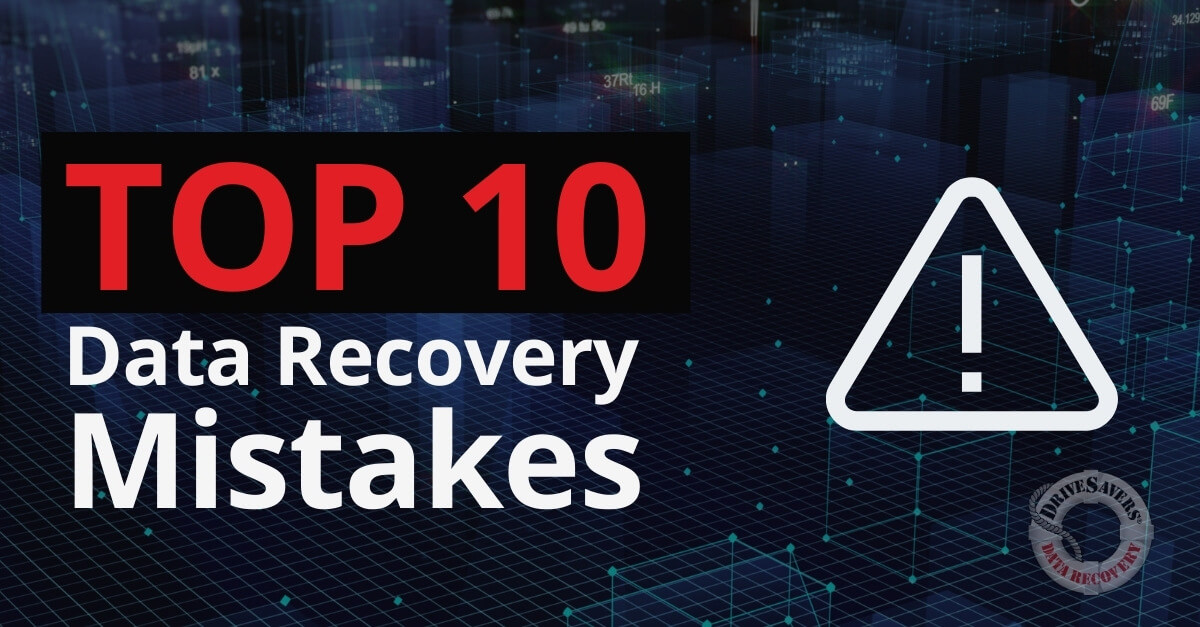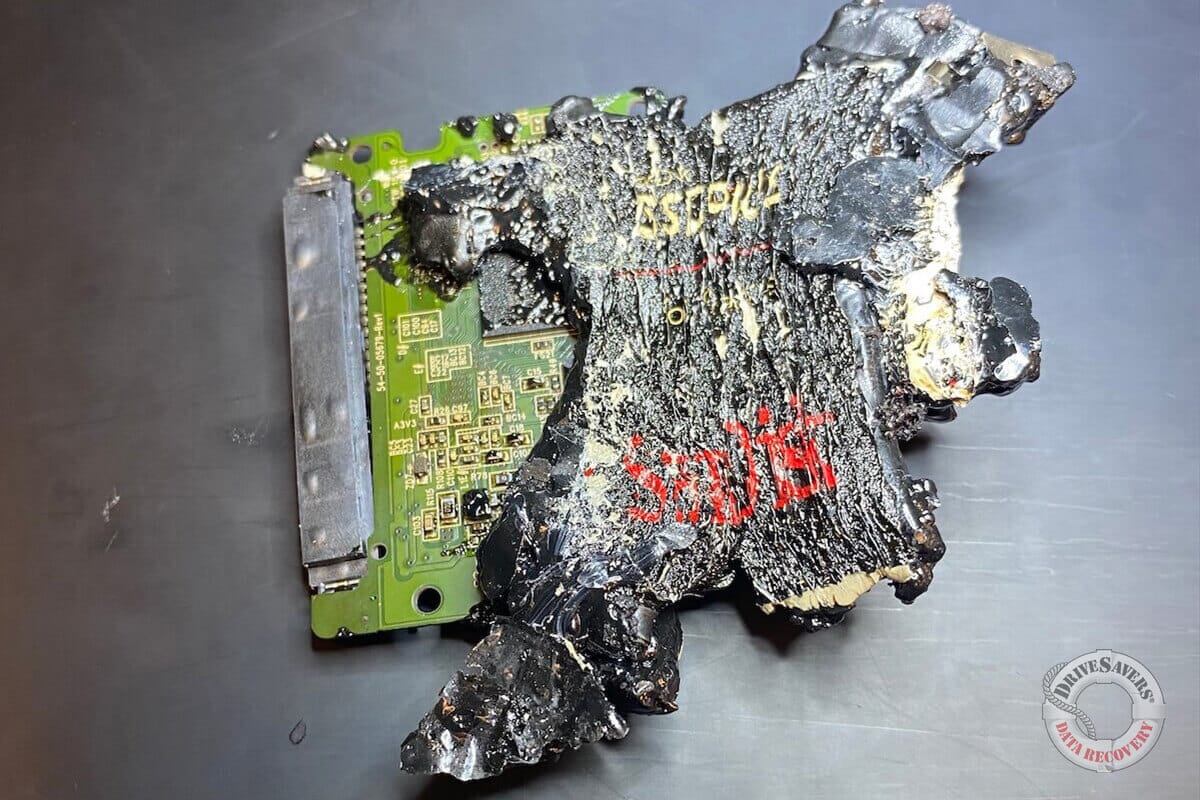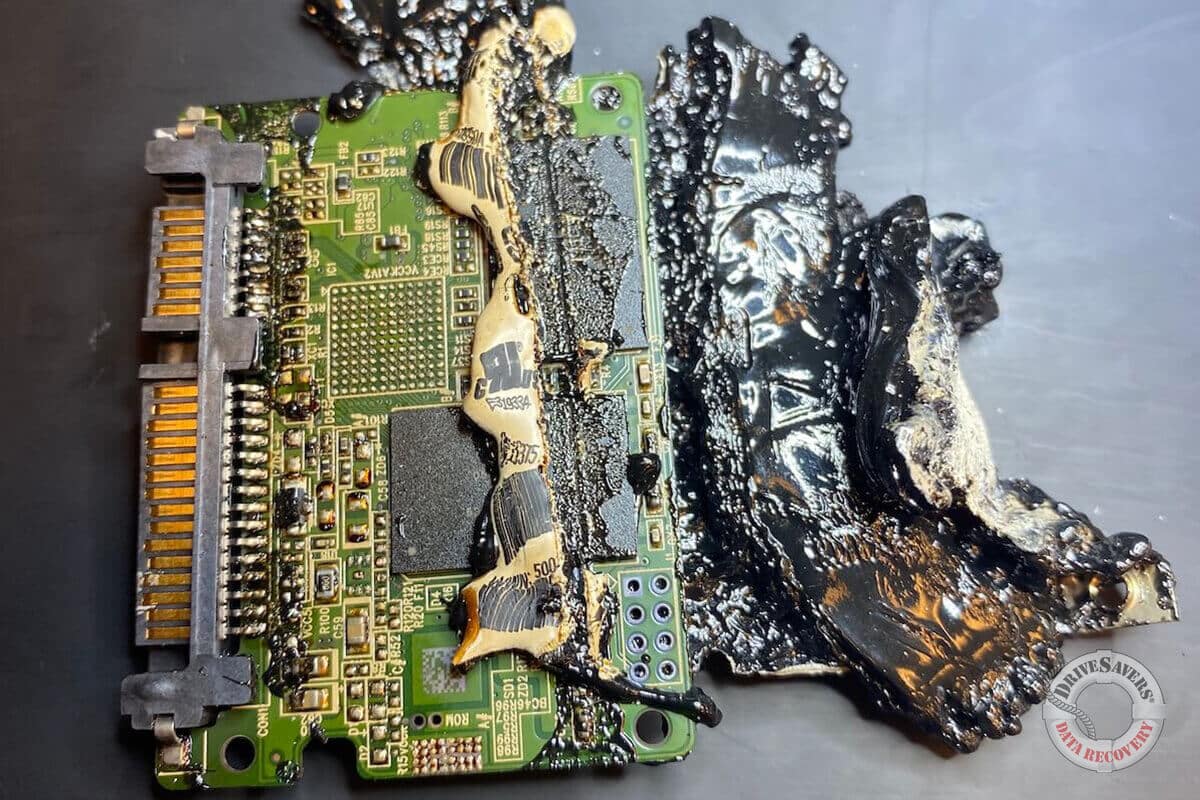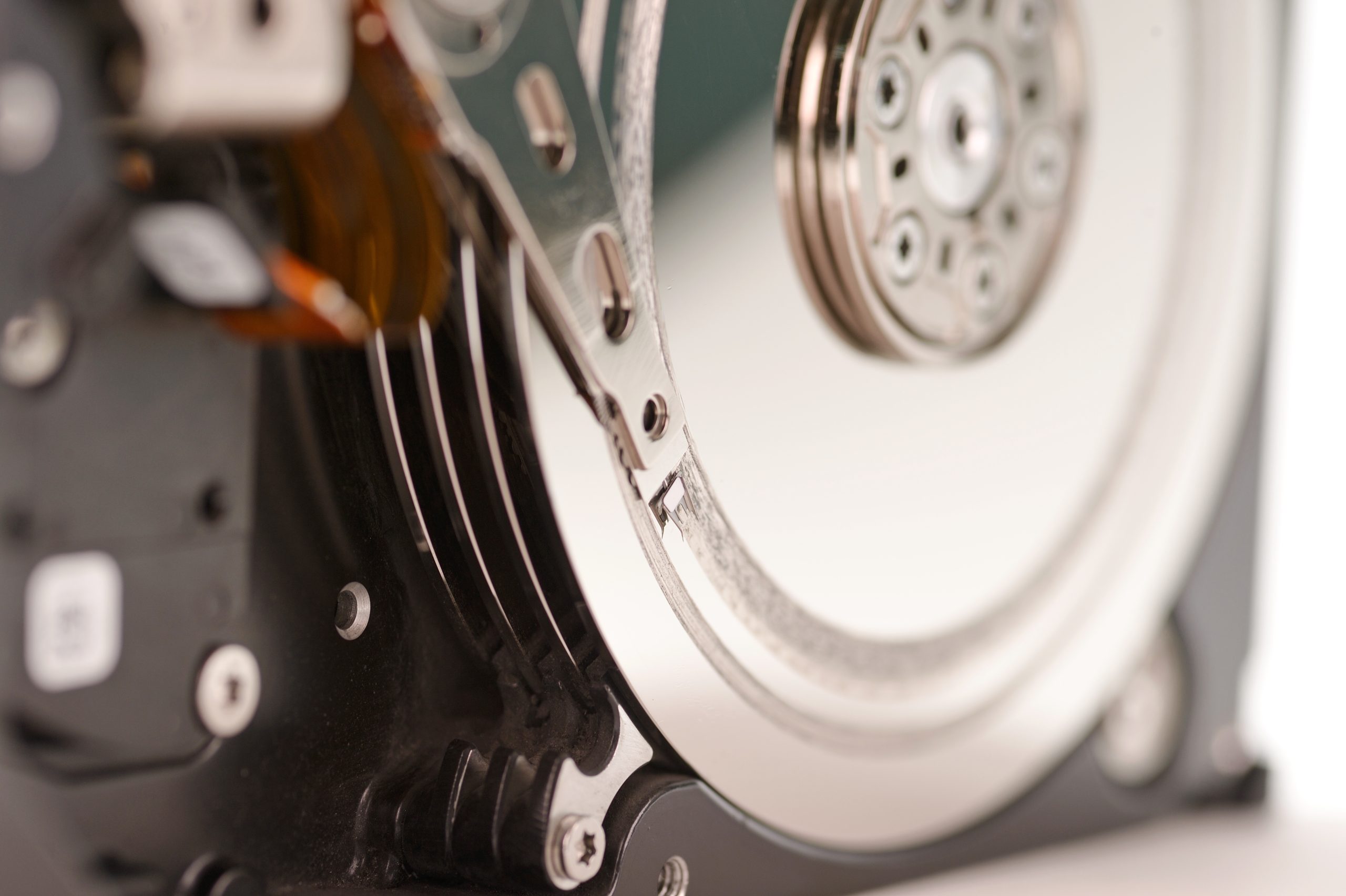The 10 Most Common Data Recovery Mistakes

Welcome to the digital era, where our lives are deeply intertwined with bytes and bits. Losing access to your digital valuables can be a heart-stopping moment, whether it’s critical work documents, precious family photos, or your favorite music collection.
Before diving into data recovery, take a moment to pause and breathe. We’re here to walk you through the maze of data recovery errors, making sure you have the best shot at successfully retrieving your data.
At DriveSavers, we’ve encountered every scenario and are committed to assisting our customers in the U.S. navigate the challenging landscape of data recovery, even from devices that seem completely lost. Let’s explore the 10 most common missteps in the journey to recover your essential digital items.
Embarking on data recovery without the necessary expertise is risky. It’s a complex field that demands a deep understanding of storage devices and recovery methods. DIY attempts without sufficient knowledge can exacerbate the situation, potentially leading to permanent data loss.
Many attempt DIY data recovery, tempted by the plethora of online tutorials and guides. Yet, these resources cannot substitute for the comprehensive knowledge and experience that professional data recovery experts offer. It’s akin to navigating a ship through a storm without a compass — the chances of success are slim.
At DriveSavers, we’ve witnessed many cases where well-meaning data recovery efforts have backfired. Both individuals and businesses, in their haste to retrieve lost files, have unintentionally caused more damage, complicating the recovery process. These instances highlight the critical need for professional intervention when facing data loss.
The internet is flooded with data recovery programs, each claiming to be your solution to data loss. Yet, these tools vary in quality. Employing unverified or poorly crafted data recovery software is risky, as it can further damage your storage device, possibly leading to irrevocable data loss.
The allure of free or inexpensive data recovery options online is strong. Despite their attractive cost, these tools often lack the effectiveness and safety of established recovery methods. They might not be regularly updated, could be incompatible with newer storage technologies and file systems, or worse, contain malware.
At DriveSavers, we’ve dealt with the consequences of using substandard data recovery software. Clients turn to us after such tools either fail to recover their data or exacerbate the issues. We emphasize the importance of opting for reputable, proven professionals for data recovery efforts.
Storage devices may look sturdy, but they are fragile internally. Physical damage is a red flag, and trying to recover data from a compromised device can cause additional problems. Recognizing and acting on these signs early can prevent further data loss.
Signs of physical damage include unusual noises from a hard drive, error alerts, or a computer failing to recognize a device. These symptoms are warnings that the device is in distress. Continuing to use a failing device risks irreparable damage.
Dealing with physically damaged devices requires precision and expertise. DriveSavers has the tools and skills to handle such situations carefully, improving your chances for successful data recovery. Don’t let physical damage spell the end of your data— allow professionals to help you through the recovery.
In today’s digital surplus, clearing space on devices becomes necessary. Yet, a common error in data recovery is deleting files without confirming a complete, accessible backup is in place. Assuming all deleted files are retrievable can lead to disappointment if backups are missing or outdated.
Backup processes are often set and forgotten. It’s crucial, however, to check that your backup is comprehensive and accessible before removing files from your device. This precaution might seem burdensome but is minor compared to the risk of data loss.
We’ve encountered numerous instances where individuals deleted files only to find their backups were incomplete or outdated. These situations underline the significance of a solid backup plan and the necessity of verifying backups before file deletion.
Our team at DriveSavers advocates for routine backup checks and recommends working with a trusted IT professional to establish a dependable backup system. Don’t rush to free up space at the cost of losing important data. Ensure your backup is up-to-date to safeguard your digital assets.
When a storage device begins to fail, prompt action is crucial. Using a failing drive can worsen problems, leading to more severe complications and potential data loss. The first step should be to disconnect the drive and seek expert assistance.
The signs of a failing drive can vary, but common indicators include frequent error messages, slow data access times, or files disappearing and reappearing. Ignoring these signs and continuing to use the drive is a bit like driving a car with a failing engine. Eventually, it’s bound to break down.
In our experience at DriveSavers, we’ve seen the repercussions of delayed action. Drives that might have had a chance at successful data recovery became unrecoverable because they were used after showing signs of failure. Our advice is clear. At the first sign of trouble, disconnect the drive and consult with a data recovery expert.
Encryption is a double-edged sword in the world of data recovery. On one hand, it provides an essential layer of security, protecting your data from unauthorized access. On the other hand, it adds a layer of complexity to the data recovery process, requiring specialized knowledge and tools to recover data successfully.
When dealing with encrypted drives, it’s crucial to understand that the recovery process is different from that of non-encrypted drives. The encryption keys should ideally be available, and the data recovery tools being used must be capable of handling encrypted data.
Our advice to anyone facing data loss on an encrypted drive is to be upfront about the encryption. Providing this information from the outset allows us to tailor our recovery process to the unique challenges posed by encryption, ensuring the best chance of success in recovering your data.
Storage media, from hard drives to SD cards, are delicate and require careful handling. Mishandling these devices, whether through exposure to extreme temperatures, moisture, or physical shock, can lead to damage and data loss.
It’s crucial to handle storage media with care, storing them in a safe environment and being mindful of potential hazards. Even small drops or exposure to liquids can be detrimental, leading to the need for data recovery.
At DriveSavers, we often encounter storage media that have suffered physical damage due to improper handling. These situations are preventable, and we encourage our clients to take the necessary precautions to protect their data.
In cases where storage media has been damaged, our team at DriveSavers has the expertise to recover data, even from the most compromised devices. However, prevention is always better than cure, and proper handling of storage media is a crucial step in safeguarding your digital data.
Once data is overwritten, the chances of recovery are slim. It’s a common belief that deleted files remain accessible until they are overwritten, but in reality, the process of overwriting can happen quickly and unexpectedly.
Avoid using the affected storage device for new data or installations, as this can lead to overwriting. Be particularly cautious when dealing with solid-state drives (SSDs), as they employ wear-leveling algorithms that can quickly overwrite deleted data.
Recovering overwritten data is a complex process with no guarantees, underscoring the importance of acting quickly and not using the affected drive.
Our team is dedicated to providing the best chance of data recovery, even in cases of overwritten data. However, the best course of action is always to avoid overwriting in the first place, safeguarding your data and ensuring that it remains recoverable.
In today’s digital landscape, cybercriminals are pervasive threat actors capable of causing significant data loss. Being vigilant and recognizing the signs of a cyberattack is crucial to preventing damage and ensuring the security of your data.
Common signs of malware or ransomware include unexpected system behavior, loss of access to files, or ransom messages demanding payment in exchange for access to your data. Ignoring these signs or attempting to recover data without addressing the underlying infection can lead to further complications and potential data loss.
Our advice to anyone facing potential malware infection is to seek professional help immediately. Our team at DriveSavers is ready to help, providing expert guidance and solutions to secure your data and maximize the chances of a successful recovery.
Time is a critical factor in the data recovery process. Delaying action when faced with data loss can lead to additional complications, reducing the chances of a successful recovery and potentially leading to permanent loss of data.
Whether due to uncertainty, fear of the recovery cost, or hopes that the issue will resolve itself, procrastination is a common response to data loss. However, the longer you wait, the more complex the recovery process can become and the higher the risk of irreversible data loss.
This can be due to data being further overwritten, hardware or software failures being exacerbated, or malware penetrating deeper, for example.
Don’t let procrastination stand in the way of recovering your data. Take immediate action, reach out to the professionals at DriveSavers, and give your digital treasures the best chance of recovery.
Safeguarding Your Digital Legacy
The journey to recover data can feel like navigating uncharted waters, fraught with potential pitfalls. But armed with the knowledge of common data recovery mistakes, you stand a solid chance of reclaiming your digital life. Whether it’s a family photo album, vital work documents, or your treasured music collection, your data deserves the best chance of recovery.
Ready to take the plunge and recover your lost data? The experts at DriveSavers are just a call away. We specialize in recovering data from all sorts of tricky situations, from damaged devices to the most perplexing data loss scenarios.
Don’t let data recovery mistakes put your digital life at risk. Contact DriveSavers today for your free evaluation, and let’s reclaim your digital world together.

Call DriveSavers Day or Night to Get a Risk-free Estimate
We will email a free overnight shipping label and then call with the results of the evaluation and the cost to recover the data. If the data is unrecoverable or you choose to decline the recovery, your cost is zero dollars.





